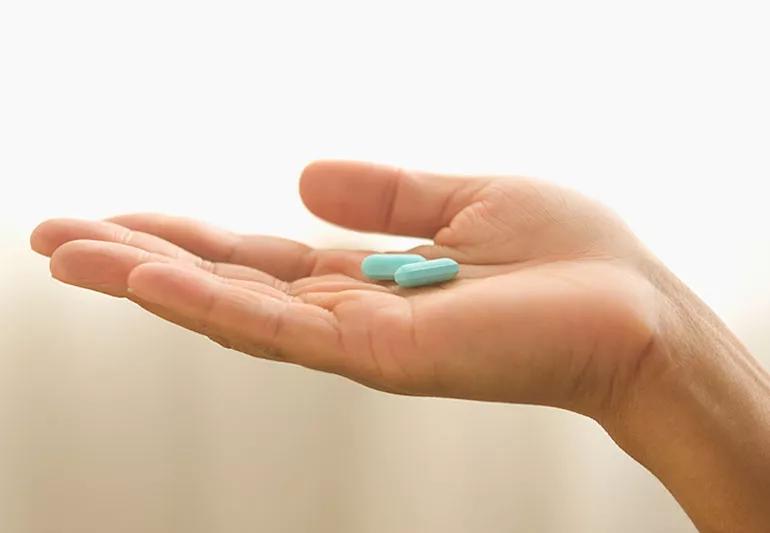A simple skin test can tell you for sure

When your doctor asks if you’re allergic to penicillin, do you say yes? Lots of people do.
Advertisement
Cleveland Clinic is a non-profit academic medical center. Advertising on our site helps support our mission. We do not endorse non-Cleveland Clinic products or services. Policy
Penicillin is a commonly-prescribed antibiotic that helps fight off a variety of infections caused by bacteria — from ear aches and sinus infections to pneumonia and meningitis. For a few people, however, it causes an allergic reaction that may include hives, rashes, itchy eyes, fever, shortness of breath, and swollen lips, tongue or face.
About 10% of the population reports a penicillin allergy, but less than 1 in 10 of those people are truly allergic. Moreover, about 80% of those who were once allergic to the drug lose their sensitivity to penicillin after 10 years. So why do so many people think they’re allergic when they’re not? And how can you know for sure?
“Penicillin is the most frequent allergy reported by patients seen at Cleveland Clinic,” says allergy and immunology specialist David Lang, MD. And that is sometimes a problem.
“When a doctor sees you have a label of penicillin allergy, it is often a barrier for getting the most appropriate care in terms of antibiotic selection,” he says.
There are two primary reasons why you may mistakenly think you’re allergic.
1. You had an allergic reaction to something else. You may have noticed a reaction in the past while taking a penicillin-type antibiotic that was not actually caused by the penicillin.
Advertisement
For example, a doctor may give antibiotics for an upper-respiratory infection. Sometimes an infection, particularly in children, also causes a rash, Dr. Lang says. Once you experience symptoms, you get an antibiotic, a rash occurs, and you mistakenly think the penicillin caused the rash.
2. You had other adverse side effects. An adverse reaction to penicillin may lead you to mistakenly believe that you are allergic. For example, penicillin may upset your stomach. While this is a common side effect, it does not mean you’re allergic.
“There are also times when people have coincidental adverse experiences,” says Dr. Lang. For example, you may have a series of headaches or unpleasant symptoms while you are taking the antibiotic, but something else is causing those problems.
Yes, says Dr. Lang. You may miss out on the most effective treatment for your condition.
Your doctor must find alternative antibiotics if you have a penicillin allergy. And alternative antibiotics often:
“A penicillin allergy needs to be challenged,” he says. “When we perform a formal allergy evaluation with penicillin skin testing, the results are negative in about every 9 out of 10 patients we evaluate. The negative skin testing implies that penicillin can be taken without an increased risk for allergic reaction compared with the general population.”
Skin testing for a penicillin allergy is commonly performed and can be done safely — even in patients who are critically ill or who have had serious reactions to penicillin, Dr. Lang says.
1.Validating the test
To ensure that your skin reacts normally, a nurse will apply both a saline solution and a histamine solution. If your skin reacts to the saline, that means your skin is too sensitive and the test cannot be interpreted.
The histamine solution should cause a red, raised, itchy area, similar to a mosquito bite. If there is no reaction, your skin test may not show an allergy even if you have one, and for this reason the test cannot be interpreted.
If your skin does not react to the saline, but reacts to the histamine, this validates the skin test: Your skin has the capacity to react to a potential allergen.
2. Testing for penicillin allergy
At the same time, a nurse places liquid drops of penicillin on your skin and scratches through the liquid so that it gets underneath the top layer of your skin. A reaction that is similar to a mosquito bite should occur in minutes if you are allergic to penicillin.
If your skin does not react to penicillin, an intradermal test is the next step, which involves a nurse injecting a small amount of penicillin liquids into your skin. After 15 minutes, the skin test is examined for signs of an allergic reaction.
Advertisement
3. Applying a challenge dose
If both the skin-prick and intradermal skin tests are negative, you’ll receive a challenge dose of penicillin or another penicillin-type drug (such as amoxicillin), and then you will be observed for 30 minutes. This challenge dose is important, Dr. Lang says, as it validates the skin testing and demonstrates that you can take penicillin and penicillin-like drugs without an allergic reaction.
Advertisement

Sign up for our Health Essentials emails for expert guidance on nutrition, fitness, sleep, skin care and more.
Learn more about our editorial process.
Advertisement

If you’re sensitive to aspirin or other salicylates, limiting exposure is the best remedy

Certain supplements, like licorice root and St. John’s wort, can raise your blood pressure or negatively interact with medication

No, but it momentarily slows down during this involuntary body function

Daily oral hygiene goes a long way to keeping your mouth healthy and your smile bright

Most kids start losing baby teeth around age 6 — but there’s some wiggle room in the timeline

Spoiler alert: Taste buds change more often than you might think

Strokes affect your brain, while heart attacks affect your heart — both can be life-threatening emergencies

High cholesterol can be genetic, but testing and treatment can lower your heart disease risk

Even small moments of time outdoors can help reduce stress, boost mood and restore a sense of calm

A correct prescription helps your eyes see clearly — but as natural changes occur, you may need stronger or different eyeglasses

Both are medical emergencies, but they are very distinct events with different causes